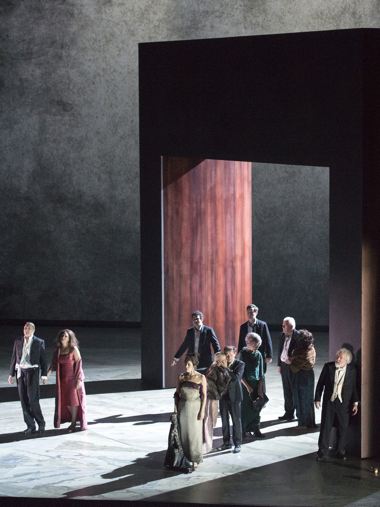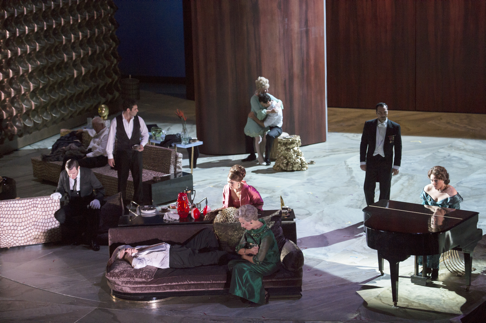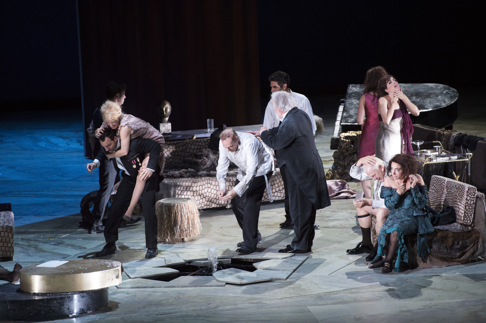
05 Aug 2016
The Exterminating Angel in Salzburg
Zeitgeist or what? What Luis Bunuel's 1962 Franco era film El àngel exterminador may mean to composer Thomas Adès' 2016 opera The Exterminating Angel.
English Touring Opera are delighted to announce a season of lyric monodramas to tour nationally from October to December. The season features music for solo singer and piano by Argento, Britten, Tippett and Shostakovich with a bold and inventive approach to making opera during social distancing.
This tenth of ten Live from London concerts was in fact a recorded live performance from California. It was no less enjoyable for that, and it was also uplifting to learn that this wasn’t in fact the ‘last’ LfL event that we will be able to enjoy, courtesy of VOCES8 and their fellow vocal ensembles (more below …).
Ever since Wigmore Hall announced their superb series of autumn concerts, all streamed live and available free of charge, I’d been looking forward to this song recital by Ian Bostridge and Imogen Cooper.
Although Stile Antico’s programme article for their Live from London recital introduced their selection from the many treasures of the English Renaissance in the context of the theological debates and upheavals of the Tudor and Elizabethan years, their performance was more evocative of private chamber music than of public liturgy.
Evidently, face masks don’t stifle appreciative “Bravo!”s. And, reducing audience numbers doesn’t lower the volume of such acclamations. For, the audience at Wigmore Hall gave soprano Elizabeth Llewellyn and pianist Simon Lepper a greatly deserved warm reception and hearty response following this lunchtime recital of late-Romantic song.
For this week’s Live from London vocal recital we moved from the home of VOCES8, St Anne and St Agnes in the City of London, to Kings Place, where The Sixteen - who have been associate artists at the venue for some time - presented a programme of music and words bound together by the theme of ‘reflection’.
'Such is your divine Disposation that both you excellently understand, and royally entertaine the Exercise of Musicke.’
‘And there was war in heaven: Michael and his angels fought against the dragon; and the dragon fought and his angels, And prevailed not; neither was their place found any more in heaven … that old serpent … Satan, which deceiveth the whole world: he was cast out into the earth, and his angels were cast out with him.’
There was never any doubt that the fifth of the twelve Met Stars Live in Concert broadcasts was going to be a palpably intense and vivid event, as well as a musically stunning and theatrically enervating experience.
‘Love’ was the theme for this Live from London performance by Apollo5. Given the complexity and diversity of that human emotion, and Apollo5’s reputation for versatility and diverse repertoire, ranging from Renaissance choral music to jazz, from contemporary classical works to popular song, it was no surprise that their programme spanned 500 years and several musical styles.
The Academy of St Martin in the Fields have titled their autumn series of eight concerts - which are taking place at 5pm and 7.30pm on two Saturdays each month at their home venue in Trafalgar Square, and being filmed for streaming the following Thursday - ‘re:connect’.
The London Symphony Orchestra opened their Autumn 2020 season with a homage to Oliver Knussen, who died at the age of 66 in July 2018. The programme traced a national musical lineage through the twentieth century, from Britten to Knussen, on to Mark-Anthony Turnage, and entwining the LSO and Rattle too.
With the Live from London digital vocal festival entering the second half of the series, the festival’s host, VOCES8, returned to their home at St Annes and St Agnes in the City of London to present a sequence of ‘Choral Dances’ - vocal music inspired by dance, embracing diverse genres from the Renaissance madrigal to swing jazz.
Just a few unison string wriggles from the opening of Mozart’s overture to Le nozze di Figaro are enough to make any opera-lover perch on the edge of their seat, in excited anticipation of the drama in music to come, so there could be no other curtain-raiser for this Gala Concert at the Royal Opera House, the latest instalment from ‘their House’ to ‘our houses’.
"Before the ending of the day, creator of all things, we pray that, with your accustomed mercy, you may watch over us."
The doors at The Metropolitan Opera will not open to live audiences until 2021 at the earliest, and the likelihood of normal operatic life resuming in cities around the world looks but a distant dream at present. But, while we may not be invited from our homes into the opera house for some time yet, with its free daily screenings of past productions and its pay-per-view Met Stars Live in Concert series, the Met continues to bring opera into our homes.
Music-making at this year’s Grange Festival Opera may have fallen silent in June and July, but the country house and extensive grounds of The Grange provided an ideal setting for a weekend of twelve specially conceived ‘promenade’ performances encompassing music and dance.
There’s a “slide of harmony” and “all the bones leave your body at that moment and you collapse to the floor, it’s so extraordinary.”
“Music for a while, shall all your cares beguile.”
The hum of bees rising from myriad scented blooms; gentle strains of birdsong; the cheerful chatter of picnickers beside a still lake; decorous thwacks of leather on willow; song and music floating through the warm evening air.

Zeitgeist or what? What Luis Bunuel's 1962 Franco era film El àngel exterminador may mean to composer Thomas Adès' 2016 opera The Exterminating Angel.
The opera is the film recast for Salzburg, Covent Garden and the Met by Adès and British stage director Tom Cairns. For Buñuel the film was gentle if macabre, humorous if macabre condemnation of Spain's Fascist bourgeoisie.
Re-worked in Salzburg the exterminating angel (an invisible presence) presides at a dinner party after an opera where its conductor's wife amuses with a (brief) piano recital and its diva is begged to sing a song by Adès. By mutual consent and compulsion no one can leave the party — for days, then weeks. Feelings fray, living conditions deteriorate. Finally the guests agree the only possible exit is to sacrifice the host. The diva has the revelation that they all now are exactly where they initially were. They leave.
 The piano recital
The piano recital
And they will be back. Like, just like the Salzburg audience. Year after year.
Adès opera is bourgeois, hook, line and sinker. Rich, beautiful music requiring everything money can buy, i.e. triple winds, huge percussion battery. Difficult music requiring extended rehearsals for orchestra and for twenty-two solo voices plus chorus and dancers. It is an undertaking only possible at institutions lavishly supported by the haute bourgeoisie. The three mentioned above are possibly the only such in existence. The ironies are blatant.
Adès inspiration is obviously complex, and finally he surely is teasing himself. And delighting in composing music that has the depth and breadth to encompass a quarrel about the size of spoon needed to stir coffee and the lengthy death of an elderly guest and then an intense love death, not to mention slaughtering a couple of lambs to avoid starvation, the cuisson of which is a lengthy discussion. The piano becomes more and more distressed, a cello is smashed, incest revealed.
 The excavation to access water
The excavation to access water
It is rich, beautiful music that can say anything, the sublime merged with the twisted, the simple with the complex. Music of Wagnerian scope and Brittenesque precision, of Buñuelian cruelty and Aristophanesque satire. It is pure Thomas Adès.
Adès somehow creates natural sounding vocal lines in surreal intervals and rhythms that explore surreal vocal ranges. The always forte orchestral score exposes extreme unidentifiable harmonies that, like Messiaen, grandly pass over or sometimes converge on beautifully inverted triads. Orchestral climaxes are sometimes hugely violent, explosive if impotent energy released. It is gratifying, very pleasurable music in service to supercilious philosophy.
As expected in Salzburg casting was exemplary, of particular note the huge vocal presence of the dinner's hostess Lucis de Nobile sung by South African soprano Amanda Echalaz, plus the freakishly high voice of American soprano Audrey Luna who squeals and squeaks the role of the opera diva Leticia. Swedish mezzo-soprano Anne Sofie von Otter sang Leonora's moving delirium and lovely if occasionally putrid prayer to the Virgin Mary. British tenor Ed Lyon and British soprano Sophie Bevan grandly intoned the love death.
The staging conceived by director Tom Cairns was adequate but not complimentary to the score, the bows (no solo bows) were excessively choreographed.
Michael Milenski
Cast and production details:
Performers: Amanda Echalaz, Audrey Luna, Anne Sofie von Otter, Sally Matthews, Christine Rice, Sophie Bevan, Charles Workman, Frédéric Antoun, David Adam Moore, Iestyn Davies, Ed Lyon, Sten Byriel, Thomas Allen, John Tomlinson, Morgan Moody, John Irvin, Franz Gürtelschmied, Rafael Fingerlos, Frances Pappas, Anna Maria Dur, Cheyne Davidson, Leonhard Radauer, Elias Karl. Sfalzburger Bachchor, ORF Radio-Symphonieorchester Wien. Conductor: Thomas Adès; Stage Director: Tom Cairns; Sets and Costumes: Hildegard Bechtler; Lighting: Jon Clark. Haus für Mozart, Salzburg, August 1, 2016.